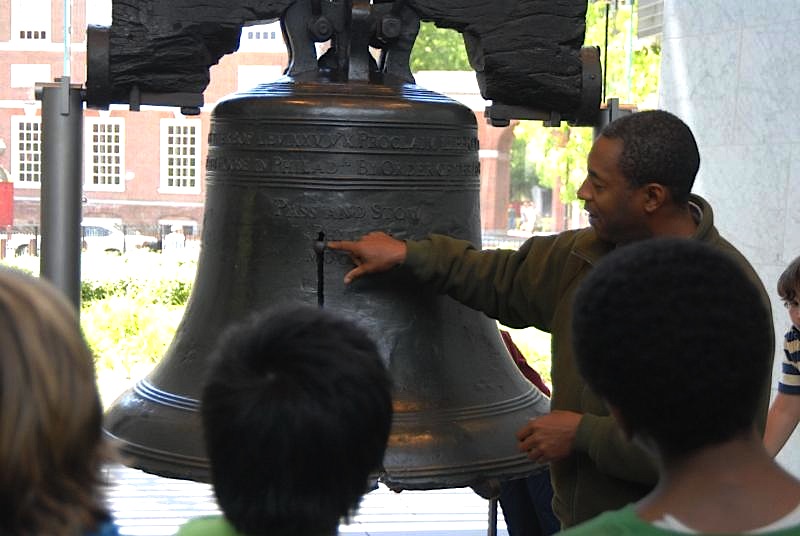DIY Tax Justice: An Idea Whose Time Keeps Coming!
As inscribed on the iconic bell in Philadelphia, “Proclaim liberty throughout all the land” is a biblical declaration (Leviticus 25:10) that heralds the time of jubilee: freed slaves, cancelled debts, redistributed land ownership. Far less proclaimed are the connections between this jubilee and the financial activities of daily life.
According to the Bible, the jubilee completed seven sabbatical cycles of release. The release of debts in each sabbatical year followed six years of tithing. Today, a tithe (one-tenth) is a voluntary giving rate — one possible percentage of what we earn. But tithing began as the original income tax.
Through years of ever-present economic uncertainty, what are we really declaring when we declare our income and deductions at tax time? Aggregated data continue to highlight our American generosity paradox: regardless of the state of the economy, lower-income people tend to donate higher percentages of what they earn — while more affluent earners tend to give in lower percentages.
This silent status quo is like the crack in the Liberty Bell that prevents it from letting freedom truly ring. Let’s turn our focus to the people across diverse communities whose smaller household budgets support broader social impacts. If we stretch beyond our usual ideological assumptions and divisions, we can share in the power of DIY (Do-It-Yourself) tax justice.
Tax justice really begins with how we approach our money beyond taxes. How are we literally spending our lives? It’s not yet part of our common vocabulary, but solidarity economics — financial practices based on fairness, cooperation, and sharing — can inform and transform our personal choices. A solidarity orientation highlights practical ways of moving our money toward greater equality.
 Globally, the secular "effective altruism" movement has directed attention to the power of percentage giving for a range of vital causes. As of this writing, 9,942 people worldwide have taken the Giving What We Can pledge to support whichever organizations they believe are most effective in improving the lives of others:
Globally, the secular "effective altruism" movement has directed attention to the power of percentage giving for a range of vital causes. As of this writing, 9,942 people worldwide have taken the Giving What We Can pledge to support whichever organizations they believe are most effective in improving the lives of others:
“We give 10% (or more) because so many in the developed world give nothing or very little….We chose 10% because it strikes a good balance. It is a significant proportion of one's income, in recognition of the importance of the problem and the need to take real action. But it is also within reach of most people in the developed world. There is also a strong historical connection to the idea of tithing….”
Giving What We Can offers a handy motivational calculator for anyone ready to stretch toward greater solidarity in financial decision-making. (And you don't need to identify with “effective altruism” to benefit from the global number-crunching!)
Now more than ever, our American tax code privileges the more affluent at the expense of lower-income people. No progress on that front is likely in the near future. We can still support progressive tax reform initiatives and protest budget cuts, but we will miss our greatest opportunities if we limit ourselves to verbal conjecture and debate (characterized in modern Hebrew as “lip tax”). As demonstrated by the longstanding generosity of lower-income donors, core money choices are never legislated out of our control.
The Hebrew word tzedakah is conventionally translated as “charity,” but is derived from the root word for justice. WAYS OF PEACE calls this just-giving: just give, AND give justly. It's an ongoing process of solidarity through personal finance. DIY tax justice can leverage deductions to channel more private money toward public needs — and even a half-tithe would exceed the new standard deduction for most affluent earners. But just-giving is much more than a tax deduction. It’s a voluntary, ethical tax that can power spare change into social change.
We face these challenges as we move through another seven-year sabbatical / release cycle — in which two three-year mini-cycles each culminate in a Year of the Tithe. Traditionally, Jews are called to account with the Tithing Declaration:
“I have set aside the consecrated [tithe] from the household; and I have given it to the [landless] and to the resident-alien, to the orphan and to the widow….”
Will we be ready to make that declaration when the time comes?
________________________________________________________________________________________________________________________
WAYS OF PEACE contributes at least 10 percent of all net staff compensation to other organizations that uphold our core mandates of renewing justice and kindness across lines of diversity and throughout the life cycle.
Please support our work today!

